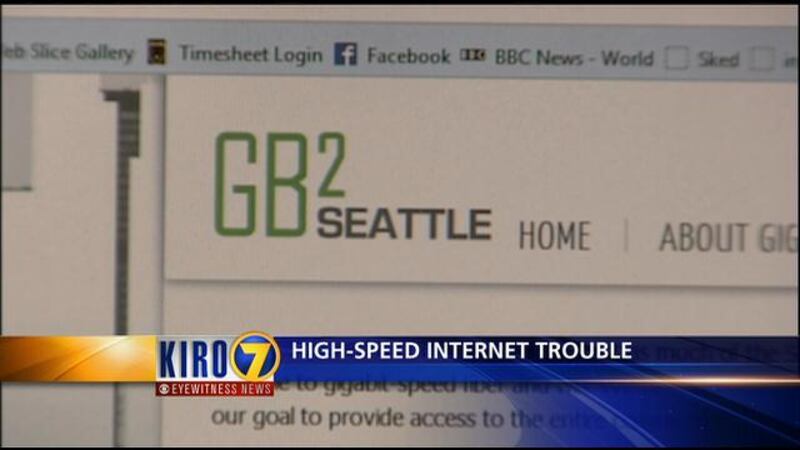SEATTLE — After Gigabit Squared ran out of money to bring high-speed Internet to Seattle, the city's Department of Information Technology is now waiting to see how the new administration wants to approach the issue.
Erin Devoto, Seattle's chief technology officer, said that Gigabit Squared also owes the city about $52,000 for a work order.
"Over the course of two administrations, the subject (of high-speed Internet) has been talked about, discussed, studied. It's heavy lift for any municipality to find that kind of funding," Devoto said, referring to the massive undertaking of building broadband fiber networks.
Even with the city's existing fiber, building a network where such fiber connects directly to the home would cost $400 million to $600 million.
Currently, private Internet providers are laying miles of fiber to increase their service. But most neighborhoods are still left out.
"There are some homes where you don't even have access to DSL, so they maybe get 1 mbps if they're lucky. This is like 1990s technology. And there are others where you're only stuck with one provider," said Robert Kangas, who is part of a citizen group called Upping Technology for Underserved Neighbors.
Kangas has been hoping CenturyLink would install fiber optic cable boxes in his Beacon Hill neighborhood, but Seattle Department of Transportation codes require telecom utility boxes to be installed below ground.
"We're totally falling behind. People cannot take classes online, we've heard from people from Amazon who can't telecommute from home. There are lots of financial impacts, including people won't move into certain areas because it has bad Internet,"Kangas said.
While his hopes with CenturyLink do not hinge on exactly the same method as those providing fiber directly to the home, he said the service would at least be faster than what he has now.
CondoInternet is one company laying fiber and connecting it to the apartment complexes it serves. Download speeds in those 77 buildings can reach 1,000 mbps or 1 gbps.
"The only problem is, that fiber doesn't exist today. It has to be built," said John van Oppen, CEO of CondoInternet.
He said that eventually, he hopes to see everyone's Internet experience to be smoother and faster.
"You pop up your YouTube and it pops the whole screen up. You hit your high definition music video and it starts immediately," he said.
Want to talk about the news of the day? Watch free streaming video on the KIRO 7 mobile app and iPad app, and join us here on Facebook.
KIRO






